
On the occasion of the 130th anniversary of Wuhan University, the International Water Law Academy (IWLA) convened an international conference for its official inauguration in Wuhan 15/16 September 2023 – “Charting a Path to Enhanced Transboundary Water Cooperation: Innovative Water Law to Tackle Hard Challenges and to Meet the UN Sustainable Development Goals (SDGs)”
The international Meeting convened in Wuhan brought together water-law experts from our global affiliate network to examine how best to contribute to the UN SDGs and the Water Action Agenda in terms of improving transboundary water cooperation.
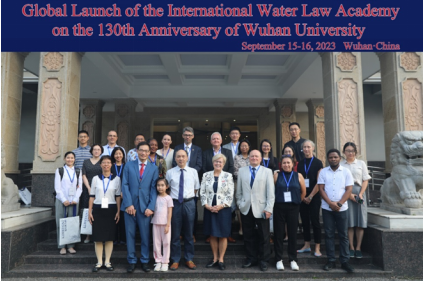
The Wuhan conference began with an inaugural lecture by the Founding Director of the IWLA, Prof. Patricia Wouters – “New Waves in International Water Law - Communities, Cooperation and Integrated Water Law”.
The Wuhan conference built on the Charting a Path Initiative (CAPI), first initiated in 2020, tackling transboundary water cooperation challenges through three broad cross-cutting themes: (i) Water and Peace; (ii) Water and Climate; (iii) Water and Sustainable Development. Each theme was led by an international expert and two commentators, with interactive discussion, which was recorded for future academic and project work.
The Wuhan Conference provided a unique platform for preparing the foundation for a collection of scholarship based on the outcomes of the discussions, to be published in a Social Science Citation Index (SSCI) journal. The topics are particularly relevant to the UN Sustainable Development Goals (especially SDG indicator 6.5.2), and the UN Water Action Agenda (WAA). The Academy will contribute to the SDGs and to the UN Water Action Agenda through its expertise in international water law. The need for integrated legal frameworks in transboundary water regimes is clear and pressing.
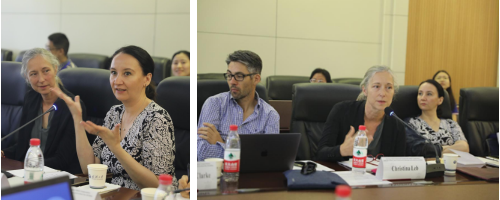
Photo 1 from left to right: Dr. Christina Leb and Dr. Dinara Ziganshina
Photo 2 Prof. Alistair Rieu-Clarke, Dr. Christina Leb and Dr. Dinara Ziganshina.
Key Outcomes of the Wuhan Conference
The IWLA international conference was a success – both in substance and practice. Especially after the isolation of Covid, the conference provided a unique opportunity to bring together experts to engage on complex topics.
Future meetings
The IWLA Wuhan Conference has also provided the catalyst for a follow-on series of academic meetings to be planned and hosted at other academic institutions within China and abroad. The University of Edinburgh Law School will host an expert meeting on two key topics presented at the Wuhan conference – the important and complex issue of convergence of international law through the lens of international water law; and the legal issue of due diligence. Both of these topics will form the substance of scholarship and expert academic meetings planned for 2024.
Special Issue of the Journal of Water Law by the Emerging Scholar’s Initiative
One of the key outcomes and aims of the IWLA Wuhan event is the generation of new, peer-reviewed scholarship. Under the CAPI’s Emerging Scholar’s Initiative, there was a global call for contributions from young scholars, which resulted in a special issue of the Journal of Water Law, announced at the IWLA Conference and soon to appear: “Charting a Path to 2030 and Beyond: Voices from Emerging Scholars in International Water Law” (editors, Prof. Patricia Wouters, Dr. David Devlaeminck, International Water Law Academy).
Project on the theme of Convergence
Building on the CAPI, the conference considered three core topics, but explored also the range of relevant issues connected with transboundary water cooperation. Participants suggested that a legal project on Convergence could be undertaken in a series of research works, developed through workshops and expert meetings under the leadership of Prof. Owen McIntyre, with support from Prof. Kong Lingjie and Prof. Patricia Wouters. This comprehensive project would require funding and strategic vision, which the IWLA agreed to take forward.
Guides and Policy Papers
This dissemination of research is an essential outcome of the conference and also of the activities of the IWLA, sharing our experiences and expertise world-wide, helping to contribute to the Academy’s core goals. The IWLA Wuhan Conference resulted in a series of follow-on projects, including developing pragmatic practice guides. The Academy has already contributed to several pragmatic practice guides – one on the integrated water law approach to transboundary water cooperation, produced in conjunction with Central Asian partners and disseminated at the New York UN World Water Meeting.
SSCI Special Issue – Community in International Law
A main theme threaded throughout the conference after its introduction by the Director of the Academy Prof. Patricia Wouters was the importance of community. While international law has developed as a state-centric system, there is also room for an expanded notion of community across layers of international water law across international, regional, sub-national – “the basin community of communities”. In this context, a special issue invites authors to revisit the concept of community in international water law from various angles.
IWLA is proposing a selection of papers for a top-ranked SSCI journal around the normative concept of “Community in International Law”, building on the inaugural lecture of Professor Patricia Wouters at the outset of the Wuhan meeting. Following is a work-in-progress academic proposal that we will put forward for the Special Issue Proposal: “The Community of Communities: Revisiting the Concept of “Community” in International Water Law”. We have identified an SSCI journal and will propose a selection of about 7-8 selected papers. The Special Issue will feature the experts who participated in the Wuhan conference.
New Research Platform on International Water Law
An exciting new development in the dissemination of research is a platform on International Water Law, to be hosted by the World Bank proposed at the Wuhan Conference by Dr. Christina Leb Senior Counsel at the Environment and International Law Department (LEGEN) the World Bank.
The chart below summarises the key outcomes of the IWLA Wuhan Conference.
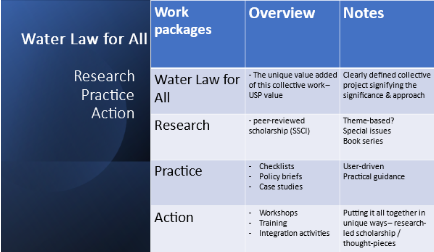
A recent collaborative project was a
Checklist of the international law applicable to transboundary hydropower projects.
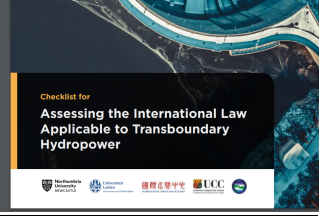
https://researchportal.northumbria.ac.uk/files/122700314/check_list_v3.pdf
The IWLA Wuhan conference showed that IWLA has unique influence in three areas:
Global influence – the IWLA Wuhan conference significantly enhanced the Academy’s international reputation as a world-leading academic institution with unique expertise in international law and water law.
China/global interface - the IWLA Wuhan conference brought together experts from across China and the globe to share their expertise and experiences in transboundary water. This helped to cross-fertilise academic and state practice approaches in the area of transboundary water cooperation. For some participants this was their first visit to China. Wuhan University and especially the university’s specialist China Institute of Boundary and Ocean Studies (of which the IWLA is proudly part), provided an excellent, professional setting for the meeting, with exceptional logistics and hosting facilities. Many of the participants expressed how positive their experience in Wuhan was.
Community-building – The theme of the inaugural lecture highlighted the importance of building communities in international law. This includes ‘communities of scholars’ and ‘scholarship’. Participants were energised and invigorated in the field of transboundary water cooperation, engaged in lively debate, contributing actively their expertise and experience.
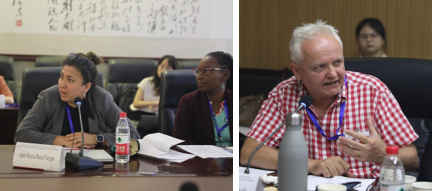
Participants listen to presentations and participate in discussions. From left to right: Dr. Ana-Maria Daza Vargas, Dr. Bernadette Adjei, and Prof. Owen McIntyre.
Focusing its unique expertise in international water law to address the difficult issues in transboundary water cooperation linked to the increasing pressures of global climate change, economic, social and environmental challenges the Academy is well-placed to contribute new and innovative scholarship and practice in this field with its global network of affiliates. The Academy is now working on its strategic vision for academic outputs for 2024/2025, which will include significant scholarship.
Research dissemination and strategic outreach
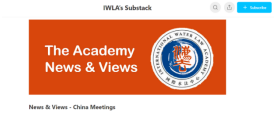 The IWLA Wuhan conference was promoted through its social media sites like LinkedIn. The Academy communications team did a Substack newsletter on the Conference which also includes an interview with founding member of IWLA Prof. Kong Lingjie, Professor of public international law and Associate Dean for research and international cooperation at Wuhan University China.
The IWLA Wuhan conference was promoted through its social media sites like LinkedIn. The Academy communications team did a Substack newsletter on the Conference which also includes an interview with founding member of IWLA Prof. Kong Lingjie, Professor of public international law and Associate Dean for research and international cooperation at Wuhan University China.
https://iwla.substack.com/p/october-2023-e9e
Substack newsletters are published each month about events the Academy participates in as well as highlighting the research of its affiliates. This process of outreach will continue through different institutional platforms.
A new development in the dissemination of research will be the creation of a platform on International Water Law, to be hosted by the World Bank. This was proposed at the Wuhan Conference by Dr. Christina Leb Senior Counsel at the Environment and International Law Department (LEGEN) the World Bank. IWLA will coordinate its outputs to be published as appropriate on this new platform. IWLA is also developing partnerships with other institutions and networks to disseminate its research. These partnerships will be announced in future as they are formally consolidated.
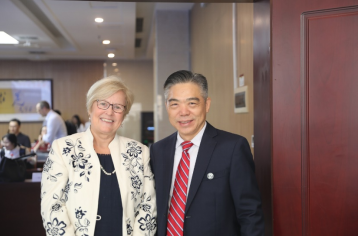
Prof. Patricia Wouters, Director of the Academy with
the Vice President of Wuhan University, Dr. TANG Qizhu
![]() Tel: 86-027-68756726
Tel: 86-027-68756726
![]() Address: Wuhan University China Institute of Boundary and Ocean Studies (CIBOS), P.R. China,
Address: Wuhan University China Institute of Boundary and Ocean Studies (CIBOS), P.R. China,
© International Water Law Academy. All Rights Reserved.